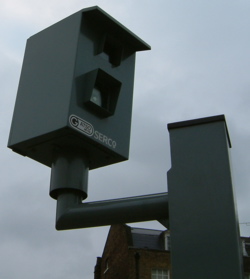We are developing the social individualist meta-context for the future. From the very serious to the extremely frivolous... lets see what is on the mind of the Samizdata people.
Samizdata, derived from Samizdat /n. - a system of clandestine publication of banned literature in the USSR [Russ.,= self-publishing house]
|
Most defences of globalisation, as far as I have seen, have focussed on the essentially economic benefits of free trade, the free movement of goods, services and people. To date – and I may have missed something – there has not been much in the way of a cultural defence of globalisation. So I was delighted to come across this book a while back by noted culture and economics writer Tyler Cowen
He makes the important point that far from crushing local cultures and imposing a blanket of bland pap on us all, globalisation has often spawned a great deal of what we would think of as “traditional” culture. Using examples as varied as Navajo textiles to Caribbean music, Cowen nails the idea once and for all that globalisation means that the entire planet is going to turn into a MacDonalds fast-food joint.
What I particularly liked about this book was its positive, thoughtful tone. He spared us any tiresome ideological hominems about capitalism and the market. Instead, he shows how trade stirs up cultures worldwide, often producing marvellous and dazzling results.
A key theme also emerging from Cowen’s study is that globalisation has in some ways vastly increased, not reduced, the diversity of cultural forms on this planet. When anti-globalistas like John Gray, for example, berate it, what I suspect they want is for the status quo to be preserved in the ways they like. They are often not all that interested in diverse cultures, more in a form of nationalism. What Cowen does is show the enormous benefits of modern fast communications, technology and speed of human contact.
I recommend this book very highly.
To be honest I have never understood what the fascination people have with so-call ‘reality TV’ programmes like Big Brother. I have forced myself to watch a couple times and ended up despairing for the future of western civilization. Suddenly my taste for explosion filled action movies and lycra clad starlets with guns does not seem so low-brow after all.

Oooo! Very exciting!
No doubt some of our faithful commenters will put me right on this area of complete disconnection between me and an entire baffling area of popular culture.
But maybe this Disneyfication of the entirely unfunny term ‘Big Brother’ that George Orwell coined will soon be coming to an end.
Then maybe we can start getting more people frowning with concern rather than smiling vacuously at the sound of the words ‘Big Brother’. Why bother watching the TV to see a bunch of self-absorbed cretins in a room back-stabbing each other when you can be in your very own rolling endless episode of ‘Big Brother’ by just walking down almost any CCTV filled high street in Britain?
Here is some real reality TV, staring… you.
 


Since the atrocity of Sept. 11 some have argued that it is necessary to restrict freedom in order to protect ourselves from terrorism while others have argued that to give up freedom for security is to destroy the thing we are fighting to defend.
This is false dilemma. Individual liberty is not a threat to our security. It is or ought to be an integral part of our security system. To illustrate this point look at the bill of rights, the first ten amendments to the Constitution. The first amendment which protects free speech, freedom of the press and freedom of religion adds to our security in two ways.
First, it largely protects us from internal religious conflict. Because the state is forbidden to interfere in private religious matters, religious groups are not in constant conflict to impose their beliefs on each other. Thus we have been mostly spared from having home grown religious terrorists.
Second, by protecting freedom of the press the first amendment increases the probability that our nation will have a winning strategy in the war on terrorism. In any country the number of people in the defense and foreign policy bureaucracy is limited. Moreover many intelligent people interested in defense and foreign policy will not join the government agencies because of the bureaucratic regimentation. In the absence of freedom of the press, only the thinking of members of these bureaucracies could shape our foreign policy. With freedom of the press the ideas of thinkers outside the bureaucracies are available for consideration by the decision makers. Thus the total brain power brought to bare on security questions is vastly increased and the probability of our adopting a winning security strategy is increased. → Continue reading: Free society is secure society
A new speed camera installed at the urging of Robert Marshall, a Conservative on South Staffordshire district council has caught its first few victims, one of whom was… Robert Marshall.
The Tory speed demon was nailed doing a whopping 43mph in a 30mph limit.

Gotcha, you Tory bastard!!!
Do you want some software that is:
A value-added, leverageable global knowledge repository.
or…
Repurposeable, leading edge thoughtware that delivers results-driven value.
Then go to Bullfighter where you can download it for free. It will look at your documents and warn you if you have started talking corporate speak.
You know you need a future-proof asset that seamlessly empowers your mission critical enterprise communications.
Biotechnology may offer some relief to long-suffering sufferers of hayfever, according to this report.
The advance of summer is always slightly spoiled for me by this allergy. My eyes go red, I sneeze violently and have to take medication to keep the symptoms at bay, which for a son of a farmer from East Anglia is not very helpful.
So if the men in white coats can figure out a way to reduce this blight on my summers, here’s to them. Is modern technology great or what?
A refreshingly straightforward opinion piece that I came across while searching the Telegraph’s site for their morsels on civil liberties and ID cards. It was written in December 2002 based on an interview with Matthias Kelly QC, new chairman of the Bar Council. It sounds as relevant now, if not more:
In David Blunkett, we have – in Mr Kelly’s words – a “profoundly illiberal” Home Secretary, but we also have a man who seems incapable of doing anything except talk tough. A good example of this is in the Government’s sudden adoption of the identity card, or “entitlement card” as it euphemistically calls the proposed £1.5 billion scheme.
Because this ministry would rather not reform or enforce the existing immigration laws, it has re-heated one of the worst ideas that was briefly considered and then abandoned by the Major government. Now the Home Office presents the discarded policy as an exciting “joined-up” piece of anti-crime thinking.
As we near the end of an unadvertised “consultation period”, the Government is hoping to spirit through an ID card scheme that will do almost nothing to help the police catch and convict criminals. The cards are an expensive stunt designed to give the impression that the Government is doing something to stop an Albanian jumping ahead of you in the queue for a hip operation.
As mentioned already, this was written in December 2002 and contains a reference to the end of an unadvertised consultation period. Is this the same one as the one that is nearing the end now? Is it another one in the spirit of we keep having ‘consultation periods’ until we get our way?
And the final words ring true to our finely tuned White Rose ears:
The ID card is practically undesirable, and as repugnant on civil liberty grounds as the assaults on jury trials and double jeopardy contained in the Criminal Justice Bill. Mr Kelly is to be congratulated for using his position at the Bar Council to sound the alarm about a government whose only toughness in the field of criminal justice is towards the presumption of innocence.
Children are always a bit of a knotty problem for libertarians (yes, I am still using that word until a better one comes along). I have almost lost count of the number of arguments I have engaged in concerning their rights or absence thereof and I have still not reached any (or very many) satisfactory conclusions.
So it is with the question of physical punishment. Every instinct I possess and every principle to which I subscribe tells me that hitting children (albeit a moderate smack to the posterior) is wrong. You can camouflage it in as many codes of discipline or doctrines of necessity as you wish but the bald fact remains that it is an assault. If assaulting somebody is wrong (and I should hope that most sane people will agree that it is) then surely it remains wrong notwithstanding that it is administered by someone who otherwise loves and cares for you and is intended to provide some sort of memorable object lesson. If I strike out at my wife, co-worker, best friend or next-door neighbour I run the risk of prosecution and a lawsuit. But not so if I strike my child.
I find it extremely difficult to justify this distinction. In fact, if anything, a child should have an even stronger presumption of physical integrity because they are incapable of mounting anything like a plausible self-defence.
So, while my mind is not closed on the issue, that is where I currently stand and that is what I currently think. But, however starkly I may oppose the physical punishment of children, I am even more stridently opposed to the idea of appointing the state as guardian:
Spanking children can lead to more severe abuse, two parliamentary committees said Monday, and urged the government to pass a law barring parents from hitting their children.
The government has already outlawed corporal punishment in day care centers and schools. But parents and guardians are still permitted to use spanking as “reasonable chastisement,” putting Britain out of step with several European countries where all physical punishment of children is illegal.
Heavens to Betsy! We’re ‘out of step’. Quick, somebody crank up that metronome.
Actually this is not a fresh hell. There is a dedicated coterie of toweringly self-righteous do-gooders who have been campaigning for years for a ban on all physical punishment to be enforced by the state and every couple of years or so they manage to force their agenda on to the front pages. I am implacably opposed to them. Quite aside from the fact that these people are so obnoxiously condescending, there is no way I want to hand an excuse to the ‘Social Working Classes’ to drive the thin end of what is sure to prove a very fat wedge in between children and their parents. It will provide further justification for them to go trampling all over people’s private lives and accelerate the process of family nationalisation and resulting social disintegration. A few red rumps are by far the lesser of those two evils.
Fortunately, I can cast aside my customary pessimism because there appears to be no chance whatsoever of this law getting onto the Statute Books. At least not yet. I allowed myself a cheer of relief upon hearing a government minister on the radio news this morning give it the unequivocal thumbs-down. I don’t believe there has been any great examination of ethics involved; more likely their minds are concentrated by the fact that (for a change) the overwhelming majority of public opinion is against any state intervention in this area. I think HMG might be tempted if they knew they weren’t going to face such stiff public opposition.
And I am with the British public on this one. Well, sort of. I do think that assaulting a child is wrong regardless of the intentions behind it but I am equally sure that legislation is a cure that will prove worse than the disease. Parents should raise their children, not the state and I hope sufficient numbers of parents share my sentiments. That is far from a perfect solution but maybe it is the least worst solution and, in any event, it is the best I can do.
An observant reader told us of what he saw in Bristol when staying at a hotel there last weekend. A notice in the Travel Inn proclaims words to the following effect:
In order to comply with police requests and to improve security, all guests paying for their rooms in cash will be required to provide ID and proof of address.
Our gentle reader’s reaction?
You WHAT?!….So, if I refuse to provide you with information you have no right to, I don’t get my room. If I do, you… Do what with it, precisely? Pass it on to the police as a “potential terrorist”? Breach my personal privacy for your own amusement? Send me incessant advertising garbage? Store it in contravention with the Data Protection Act?
Can you tell he was not impressed?
This is a well spotted ‘minor’ occurrence. No police state can maintain its hold over society without its little helpers, who function, not exactly as the hand of the state, but certainly its ‘dainty’ prying and sticky fingers, deep in the everyday life of those around them. They exist in every society and although Britain is not a police state, I would not want to underestimate their reach, especially given the current government policies in the UK. Big Brother seems to have many cousins…
While it is pointless to even pretend that they are not enjoying every single second of this, we should bear in mind that Messrs.Blunkett & Co at the Home Office did not dream up this ID card malarkey all by their iddle-widdle selves. Let us not forget who is really giving the orders:
EU citizens will have their fingerprints stamped on their passports or undergo an iris scan as from next year, under proposals to be drawn up by the European Commission.
By putting two and two together (generally a rewarding activity) we can see why HMG is so grimly determined to see us all electronically tattooed. They have no choice in the matter. Mind you, the EUnuchs might argue that neither do they:
These measures partly stem due to a US law enacted in 2002, which will start demanding visas from EU citizens from 26 October 2004 if they do not have biometric information (fingerprints, iris scans or DNA) on their passports.
Only ‘partly’, though and it is an argument I would be reluctant to buy. Given the top-down nature of continental societies, I find it very hard to believe that the EU would not have been busily constructing some grand cattle-branding scheme without any prompting from Washington. If, as we are constantly being assured, the Euros were truly determined to establish themselves as ‘the alternative superpower to America’, they would, presumably, tell Uncle Sam to get stuffed.
Most instructive though, if rather disheartening, to actually watch the foundations of a global security state being hammered into place. The technology exists, you see.
Amid the recent revival of the spectre of large tax increases, a simply splendid post by David Farrer pointing out exactly why the political classes need them:
The truth is that the welfare state is bankrupt and almost no one, not the Scotsman editorial writer and certainly not the Tories, is willing to say that the Emperor has no clothes.
And not just the British welfare state either. For all the robust free market rhetoric that frightens the piss out of European lefties, the American welfare state is in just as parlous a condition:
Are we really broke? The answer is clearly, YES, but living on borrowed time and money. A recent study was done by Jagadeesh Gokhale and Kent Smetters which measures our government’s current debts and projected debts based on the proposed federal budget and revenues for 2004. By extending the numbers in constant 2003 dollars, they have come to the conclusion that the Federal government is officially insolvent to the tune of $44 trillion.
According to Financial Sense Online (from whence the above quote is lifted) both Medicare and Social Security will be bankrupt by 2010 or 2011.
This is really the big, global, dirty, open secret: the 20th century welfare state constructs are lurching, creaking and on the verge of collapse. Yet, in polite circles, this looming disaster cannot even be discussed, let alone addressed. Such is the taboo status of the welfare state that most Western politicians would rather be seen to publicly champion child molestation than any serious reform agenda.
It is for this reason that the reactionaries are trying to float various methods for the state to plunder everything and anything they can in the desperate, febrile, frantic hope that they can put off the Day of Reckoning for just a few more precious years.
Guardian argues that the key question about ID cards is not whether we have to carry them but what will be on the national database:
Now it is about how much information the government has on each of us, what the authorities want to do with it, and what rights are lost by those who don’t have what is, after all, officially being called an “entitlement” card. The real dangers now are over “function creep” and what will happen to a new cardless underclass who could be called the sans plastiques – a new British cousin for the French sans papiers.
Already function creep is beginning to surface, even though the cabinet is only now getting down to discussing the fine detail of the legislation to be introduced this autumn. In fact, as Blunkett’s white paper last July made clear, the proposal is really about setting up the first national central database of all people over 16, including foreign nationals, who are legally resident in Britain. It is this register, and not the bit of plastic in our wallet, that causes the real anxiety.
The white paper makes clear that one of the aims of the scheme is to “establish for official purposes a person’s identity so that there is one definitive record which all government departments can use if they wish”.
Some commenters have already complained about the bovine and passive nature of the British public, so this should just confirm their views:
The real problem is that we are only too willing to sell our privacy cheap. We will happily give a supermarket our entire personal lifestyle profile simply to get a plastic loyalty card. We are going to help the government create an immensely powerful personal database on each of us, not because of some damnable Whitehall conspiracy but because we couldn’t wait to get our hands on a new piece of plastic.
Also, an earlier Observer article calls for outright abandonment of the whole idea of identity cards:
The arguments against are clear and unchanging. Identity cards create new crimes and criminals while being blunt and ineffectual weapons against fraud and identity theft. They are expensive (Mr Blunkett bypasses Treasury objections only by suggesting we pay £25 for the privilege of holding records of our own fingerprints). Above all, a regime of ID cards, whether kept in a drawer or carried on our person, will create new tensions between police and ethnic minority communities, undoing much positive progress. The divisive ‘sus’ laws will be back with a vengeance.
The Home Secretary hopes to bring forward legislation after a general election. We hope the Cabinet will change his mind.
|
Who Are We? The Samizdata people are a bunch of sinister and heavily armed globalist illuminati who seek to infect the entire world with the values of personal liberty and several property. Amongst our many crimes is a sense of humour and the intermittent use of British spelling.
We are also a varied group made up of social individualists, classical liberals, whigs, libertarians, extropians, futurists, ‘Porcupines’, Karl Popper fetishists, recovering neo-conservatives, crazed Ayn Rand worshipers, over-caffeinated Virginia Postrel devotees, witty Frédéric Bastiat wannabes, cypherpunks, minarchists, kritarchists and wild-eyed anarcho-capitalists from Britain, North America, Australia and Europe.
|









